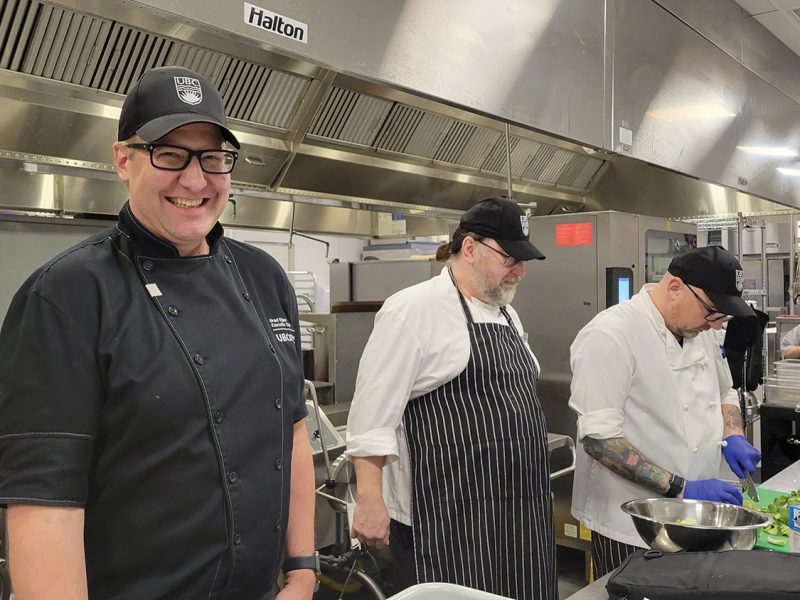KELOWNA – A year-old pilot program at UBC Okanagan is showing that providing more locally sourced foods for students takes resources well as commitment.
Since September 2021, UBC has been working with the North Okanagan Land to Table Network to bring more local food to campus.
A participant in the province’s Feed BC program, which aims to increase local purchasing by provincially-funded institutions, the school currently sources between 30% and 35% of its produce from local suppliers, a marginal increase from 2021. However, there is potential for growth given that a typical UBCO student with a meal plan eats about 720 times during the school year.
“Some of the best product in the world grows within 30 kilometres of Kelowna so I’m always exploring,” says UBCO executive chef Brad Vigue, who grew up in Salmon Arm. “My goal is 50% of produce purchased locally by 2024.”
One of the first partnerships under the pilot was with Shuswap Organics in Enderby, which supplies UBCO with almost all of its potatoes, carrots, cabbage, and Brussels sprouts.
“In 2022, because our catering program ran over summer, we started buying from Shuswap in mid-July and can do so as long as products keep in storage, which can be February or March, depending on the item,” says Vigue.
Shuswap Organics owners Owen Madden and Emily Jubenvill have been farming about five years. To meet UBCO’s needs, they also started aggregating produce from other growers, including Mara Valley Produce in Grindrod, Loveland Acres in Salmon Arm, Pilgrim’s Produce in Armstrong, Wild Flight Farm in Mara, and Green Croft Gardens in Grindrod.
By working together, smaller local growers are able to meet UBCO’s needs while avoiding a series of small deliveries that can be logistically impractical and too labour-intensive for UBCO.
“Farms we’re aggregating from are in the one to 15-acre range,” says Jubenvill. “There’s lots of room to grow the amount of product sold. The university has real purchasing power and every dollar made at the farm is staying here in the community.”
Jubenvill says working with UBCO is an example of how small to medium-sized farmers who want to work with large facilities can do so.
“It’s possible to source locally, not only in our short growing season, but also by expanding capacity for winter storage enabling produce year-round. If we can grow the marketplace pie, it makes it viable for new farmers to start up,” she notes.
Partnership instrumental
Vigue says the school’s partnership with NOLTN, founded to help small to medium-sized farmers move beyond direct sales and farmers markets, has been instrumental in making connections with local suppliers.
NOLTN director Liz Blakeway says the developing relationships between UBCO and local producers are a big step towards regaining the infrastructure needed for local sourcing.
“There’s been a long-term de-investment in local food supply, supply chains and processing, which is a very real challenge,” she says. “We’ve largely lost local food infrastructure.”
UBCO has also partnered with Curlew Orchard in Vernon for organic apples grown on six acres. They also worked intermittently with
D Dutchmen Dairy Ltd. in Sicamous and Kyla King of Rad Jamz in West Kelowna for jams and jellies, as well as with a few local cured meat producers for charcuterie.
But meat supplies are an issue, especially for niche products like halal-certified meat – an integral component of butter chicken, which creates the longest line at UBCO’s dining hall when it’s on the menu.
“We are sourcing chicken from Vancouver because we want our poultry to be halal,” says Vigue. “While there’s really good high-volume poultry producers in the Okanagan, they aren’t halal.”
It’s the type of barrier he feels the university could help change.
“Local providers are motivated to find a way to work together. It’s in our shared best interests. I would rather buy from the farm that’s close than shipped from Vancouver, especially when we saw the impact of last winter’s road shutdowns disrupting supply chain routes. The more local we are, the more resilient,” says Vigue.
But keeping students who want more meal variety and more internationally influenced foods means food items and volumes required change when UBCO’s menus change. Gathering potential farm and food partners takes time, and a lack of staff to seek out suppliers and make arrangements complicates the task.
“The Okanagan produces beautiful pears available summer through the following spring. We should be buying them. We have farms within 10 kilometres, but it takes time to figure out aggregation, delivery and storage,” says Vigue.
While sourcing locally takes more effort, Vigue knows it’s worth it.
“When we got the first delivery of Shuswap product,
I was like a kid in a candy store running around with handfuls of carrots going, ‘Just try them. Don’t ask any questions. Just taste this. This is why we buy local,’” he says.


 Generational change for finances
Generational change for finances